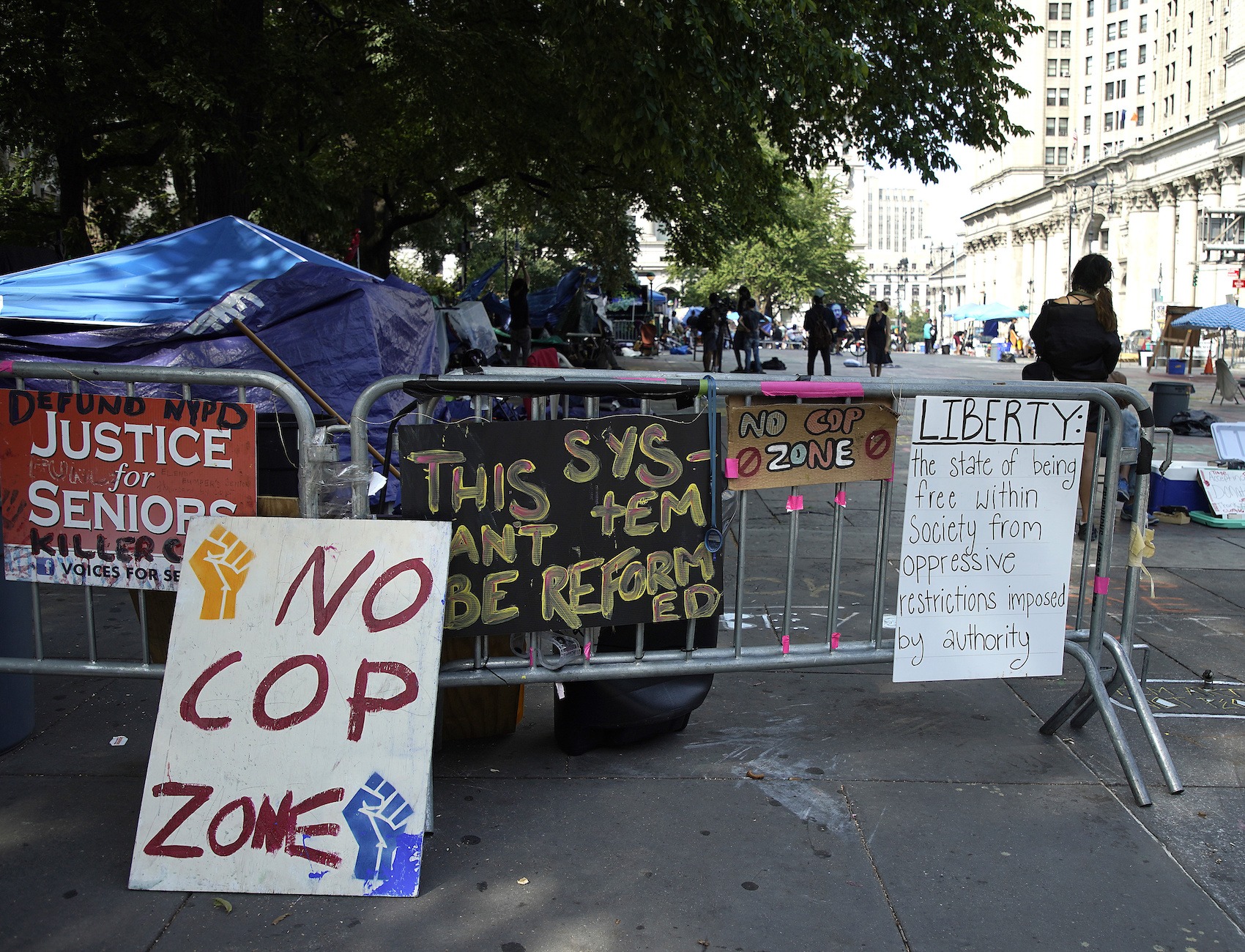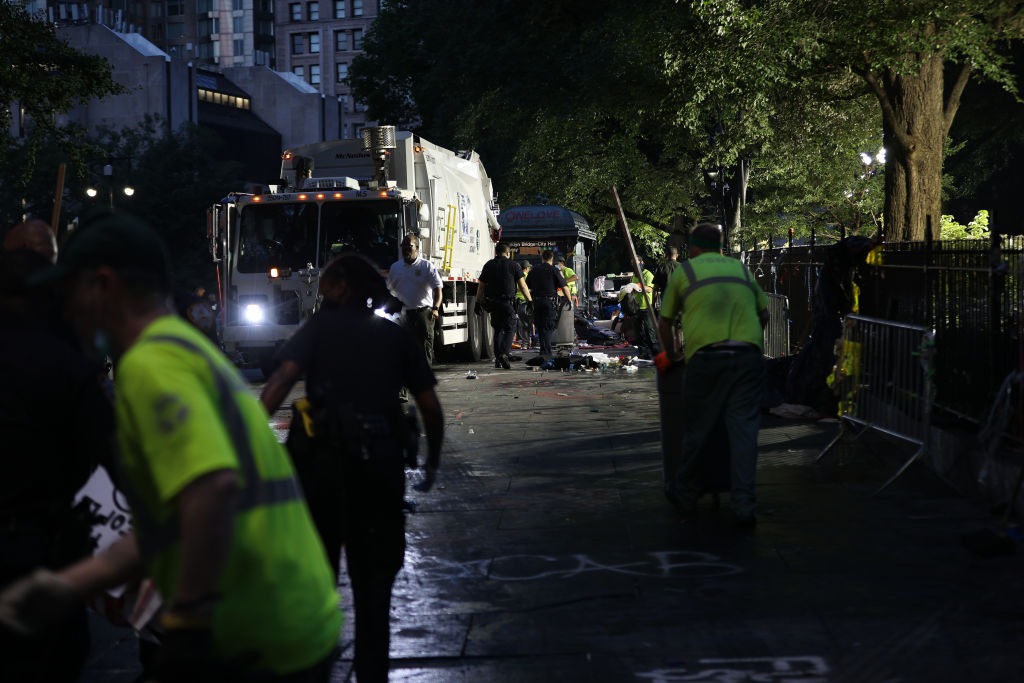After Woman’s Arrest in Unmarked Van, New York City Activists Fear Targeting by NYPD
Protesters believe law enforcement is looking for retribution after police arrested a woman Tuesday night and placed her in an unmarked van, a callback to recent events in Portland, Oregon.

On Tuesday evening, an unmarked gray van pulled up alongside 18-year-old Nikki Stone as she skateboarded near the front of a protest march in the Kips Bay neighborhood of Manhattan. Five plainclothes police officers then jumped out, tackled Stone to the ground, threw her into the van, and whisked her away, per videos posted to social media.
As the van holding Stone began to drive away, bicycle-mounted police descended on the surrounding protesters, the videos show. Protesters say the officers pepper-sprayed them and made forceful arrests. The ambush took the marchers by surprise, they said; Tuesday’s demonstration—a “24-hour march,” which included planned activities like a teach-in and a film screening—had been non-confrontational until then. When Stone was arrested and police confronted other marchers, the group was leaving a skateboarding event and heading to a meditation event.
To many, the scene was reminiscent of recent events in Portland, Oregon, where federal agents deployed to the city have been caught on video nabbing protesters and taking them away in rental vans. But the officers in this car were local—part of an NYPD warrant squad, which “uses unmarked vehicles to effectively locate wanted suspects,” according to a police statement on the arrest posted to Twitter. The statement said Stone, who was released from custody early Wednesday morning, had damaged “police cameras during 5 separate criminal incidents in & around City Hall Park,” roughly three miles from where the arrest took place. The statement does not specify when the alleged incidents occurred. Police also claimed that the “arresting officers were assaulted with rocks & bottles,” despite there being no video evidence to back up their assertion.
Mayor Bill de Blasio said Wednesday that “it was the wrong time and the wrong place to effectuate that arrest” but “no one is allowed to damage police property.” In response to police claims about rocks and bottles, he said, “I’ve seen plenty of evidence unfortunately of rocks being thrown at officers, bottles being thrown at officers, all sorts of efforts to harm officers. We have to be honest about it.”
Other elected officials in the city were quick to weigh in on the incident. Public Advocate Jumaane Williams and Comptroller Scott Stringer both said they were “concerned”; Corey Johnson, the City Council speaker, called a video of the arrest “incredibly disturbing.”
Meanwhile, to many protesters who were at the march, Stone’s “kidnapping,” as some have described it to The Appeal, is a terrifying update to what they fear is an emerging trend in their city: the retributive targeting of abolitionist activists.
The protest march at which Stone was arrested was organized by Abolition Park, a collective of activists who, for four weeks in June and July, helped organize and run a protest encampment at New York’s City Hall. The encampment, which started out as a demonstration known as Occupy City Hall that demanded cuts to the NYPD’s fiscal year 2021 budget, soon morphed into something more permanent—an exercise in police abolition, which aimed to build community via free resources, discussions, teach-ins, events, direct action launches, and more.
During the City Hall project’s nearly month-long existence, organizers with Abolition Park experienced some violent run-ins with police, but the encampment itself remained mostly untouched by law enforcement—until, at 3:40 am on July 22, officers descended on the space, made arrests, and tossed most of the encampment in the trash.
The Tuesday demonstration at which Stone was arrested was the first Abolition Park project since the destruction of the City Hall encampment.

But, according to organizers, Stone’s arrest wasn’t the first time an Abolition Park activist was arrested for their participation in the City Hall encampment after its closure. On the night of July 24, at a demonstration near Foley Square, a 20-year-old protester, who requested that The Appeal not use her name because of her pending court case, was walking away after she and others had verbal confrontations with police when a line of bicycle cops flanked them, she said. She heard someone behind her call out “her,” at which point a group of bike cops arrested her and five other protesters. She later found out that she was arrested not because of anything that happened that night, but because police were accusing her of assaulting an officer the previous week at a confrontation on the Brooklyn Bridge near the City Hall encampment. During that confrontation, according to organizers, police arrested three dozen protesters and injured several more. She denies the accusations, and is retaining a lawyer for the pending charges.
“They’re arresting people for fighting for their rights,” she said. “That’s it.”
Other protesters complained that police have targeted some of the most vocal demonstrators for multiple arrests for seemingly no reason other than to get them off the street and out of the way. “The same people with the loudest voices … are getting specifically arrested multiple times and targeted,” said one regular Abolition Park protester, who asked to remain anonymous for this reason.
The apparent targeting and forceful arrest of Abolition Park activists on what they say are old, trumped up, or trivial charges has them increasingly on edge. They fear that they’ll be targeted more pointedly and treated more harshly by the NYPD because of their participation in the City Hall encampment, and their continued affiliation with Abolition Park.
One protester told The Appeal that she even feared for organizers who go on the record with the media, pointing out that Stone had been prominently featured in a Gothamist article about the City Hall encampment and feeling accepted as a trans woman in the space. “At the end of the day, community takes care of the people,” she told Gothamist. “We don’t need a heavy police presence.”
“This is personal,” said one organizer who goes by Chillian. “We’re saying abolish the police, and this is the police, and I see them now identifying people. … It’s dangerous.”
